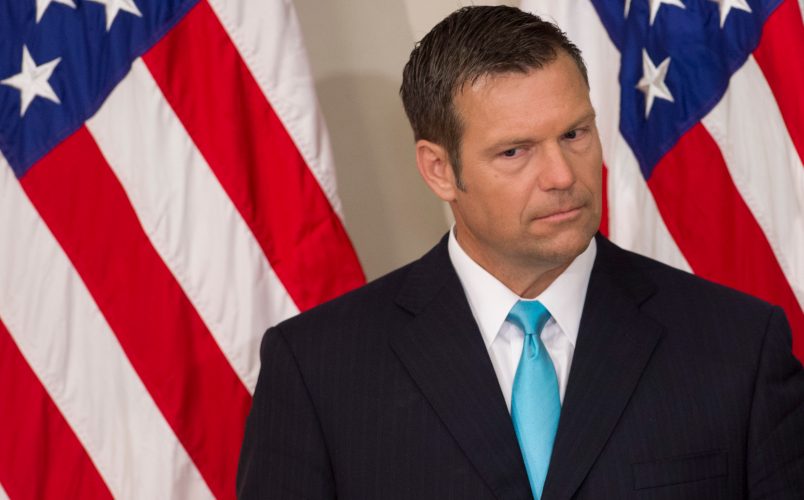Former Kansas Secretary of State Kris Kobach acknowledged that he did not properly supervise his trial team during their disastrous performance in the proof-of-citizenship voter registration case.
The acknowledgement was part of an agreement that resolved a disciplinary claim filed against Kobach for his conduct in the case. After the 2018 trial, a judge struck down the requirement while ordering Kobach take legal education classes.
His agreement with the Kansas Disciplinary Administrator’s Office also said that “There was no finding of dishonest conduct on the part of Mr. Kobach.”
Though these kinds of agreements, known as a diversion agreements, are usually kept confidential, the disciplinary office and Kobach agreed to make a portion of the agreement public.
The diversion agreement was first reported Monday by the Topeka Capital-Journal. The full findings of the agreement, which was reached on Oct. 10, remain confidential and only a small portion was publicly released.
In addition to U.S. District Judge Julie Robinson’s order that Kobach take legal ed classes, a magistrate judge slapped Kobach with sanctions including an $1,000 penalty for misleading the court about key evidence he was withholding in the litigation. The evidence was a proposal he presented then President-elect Trump — as captured in an infamous photograph — that pitched the incoming administration on changing the voting rights law that was at the heart of the legal battle over his proof-of-citizenship requirement. Robinson also held Kobach in contempt for not complying with orders she issued over the course of the case.
During the March 2018 trial, Kobach and his trial team struggled with the basics of court procedures, earning several verbal corrections by Robinson as well as her chastisement in her final order of Kobach’s “repeated and flagrant violations of discovery and disclosure rules.”
The disciplinary complaint about his conduct was brought by local attorney Matthew Hoppock, Topeka social activist Keri Strahler and others, according to the Capital-Journal.
In a statement to the Capital-Journal, former Kobach spokesperson Danedri Herbert said the complaint was “obviously politically motivated.”
“As the office of the disciplinary administrator stated, there was no finding of dishonest conduct on the part of Mr. Kobach,” Herbert, who was Kobach’s spokesperson when he was secretary of state, said. “That was the central allegation of the complaint, which was obviously politically motivated.”
Robinson’s ruling on the registration requirement was appealed by Kansas up to the 10th U.S. Circuit Court of Appeals. While Kobach insisted on leading the Kansas’ defense of the requirement at the trial stage of the case, the Kansas attorney general’s office took over the legal representation when it was before the appeals court.
The 10th Circuit has not issued its decision yet. Meanwhile Kobach lost his 2018 gubernatorial race to Democrat Laura Kelly and is currently running for Senate.
Read the public disclosure from the agreement:
Pursuant to Supreme Court Rule 203, information regarding complaints referred to the Attorney Diversion Program is considered confidential. By agreement of the parties, the Office of the Disciplinary Administrator confirms that Kris Kobach entered into a diversion agreement with the office on ______. Successful completion of the diversion will resolve the disciplinary complaint(s) filed against Mr. Kobach alleging misconduct in matters relating to the federal court litigation, Fish, et al. v. Kris Kobach. In the agreement, Mr. Kobach stipulated that he did not properly supervise both lawyer and nonlawyer staff during the federal court litigation, in violation of KRPC 5.1 (Responsibilities of Partners, Managers and Supervisory Lawyers) and KRPC 5.3 (Law Firms and Associations: Responsibilities Regarding Nonlawyer Assistance). There was no finding of dishonest conduct on the part of Mr. Kobach.



